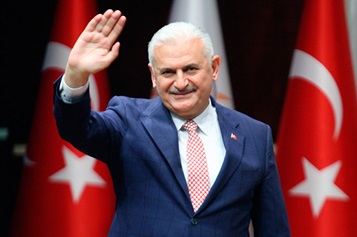Fall-out from Trump's Middle East Policy in the South Caucasus?[Over]  By Benyamin Poghosyan, PhD, Executive Director, Political Science Association of Armenia By Benyamin Poghosyan, PhD, Executive Director, Political Science Association of Armenia
Trump's hard line approach towards Iran may derail ambitious plans to develop North-South trade and transport corridors in the South Caucasus.
On May 20, 2017, US President Donald Trump arrived in Saudi Arabia on his first stop of his week-long international trip. The new US President chose the Saudi visit as a focal point for presenting key pillars of his Middle East policy. Delivering a speech to the Arab - Islamic - American Summit, President Trump stressed the significance of the fight against terrorism and the important role regional states have to play in that struggle. Another key point of his speech was tough criticism directed against Iran. READ MORE
China's "Belt and Road" Initiative: Game Changer for the South Caucasus[Over]  By Benyamin Poghosyan, PhD, Executive Director, Political Science Association of Armenia By Benyamin Poghosyan, PhD, Executive Director, Political Science Association of Armenia
On 14-15 May 2017, 29 world leaders, including Russian President Vladimir Putin and Turkish President Erdogan, gathered in Beijing for the international forum of the "Belt and Road" initiative. The Forum was the biggest event since the launch of the 'One belt one Road' initiative put forward by Chinese President Xi Jinping in 2013. China invited countries and regions to jointly build the Silk Road Economic Belt and the 21st Century Maritime Silk Road with at least five routes of economic cooperation. READ MORE
Iran-Russia Relations in the South Caucasus[Over]
 By Benyamin Poghosyan, PhD, Executive Director, Political Science Association of Armenia By Benyamin Poghosyan, PhD, Executive Director, Political Science Association of Armenia
Russia and Iran for the moment have shared interest in containing western and Turkish influence in the South Caucasus. In the longer term, however, their relationship in the region is likely to become more competitive than cooperative. READ MORE
The EU May Play Vital Role in Transforming Armenia[Over]  By Benyamin Poghosyan, PhD, Executive Director, Political Science Association of Armenia
By Benyamin Poghosyan, PhD, Executive Director, Political Science Association of Armenia
On March 21, 2017 Armenia and the EU initialed a new bilateral Comprehensive and Enhanced Partnership Agreement. This is an important milestone in bilateral relations, especially taking into account Armenia's last minute withdrawal in 2013 from initialing its Association Agreement negotiated within the framework of the EU Eastern Partnership program. READ MORE
Is US–Russia Rapprochement Still Possible?[Over]  By Benyamin Poghosyan, PhD, Executive Director, Political Science Association of Armenia
By Benyamin Poghosyan, PhD, Executive Director, Political Science Association of Armenia
The perspectives of the US – Russia relations under the Trump Administration is one of the key foreign policy issues hotly debated in political and expert circles both in the US, Russia and elsewhere. The steep deterioration of bilateral relations since the start of the third Presidential term of Vladimir Putin brought back into the scene almost forgotten terminology of “Cold War”, “containment”, “great power rivalry”. READ MORE
Adjusting the EU's Geopolitical Posture in the Eastern Neighborhood[Over]  by George Vlad Niculescu, Head of Research, the European Geopolitical Forum
by George Vlad Niculescu, Head of Research, the European Geopolitical Forum
How could the EU best deal with a revisionist Russia who challenged the post-Cold War European security order, most notably in Ukraine and in Georgia? We should probably start from considering EU’s current strategic options in its Eastern Neighbourhood. The key question here is what should be the EU’s objective in this contested region? Is it to find a compromise solution with Moscow on how to fix the broken security order? Or is it to defend its shared values in the Eastern Neighbourhood, and to eventually annihilate the Russian power and influence? READ MORE
Turkey will reconcile with Syria[Over]

Prime Minister Binali Yildirim said that Turkey is heading to restore relations with Damascus. "We will expand our circle of friends. We have already begun to do so. We normalized our relations with Israel and Russia, and now, I am sure, we will do the same with Syria. We need it to be done", - said Yildirim, speaking on Turkish television. READ MORE
Turkey-Armenia Relations after Turkey’s Elections[Over]  Armen Grigoryan, Armen Grigoryan,
EGF Guest Contributor
The outcome of Turkey’s recent parliamentary elections may partly reduce tensions in relations with Armenia, stopping the mounting hostile rhetoric of recent months. A normalization of bilateral relations should not be expected at this stage, but the trend of increasing cooperation in the humanitarian area, and in culture, tourism, and the media in recent years will likely continue. At the same time, some policies may need READ MORE
This article was first published by the "Central Asia-Caucasus Analyst, Central Asia-Caucasus Institute & Silk Road Studies Program Joint Center" which holds the copyright for it.
Latest interview with George Vlad Niculescu, Head of Research, the European Geopolitical Forum[Over]  George Vlad Niculescu,
George Vlad Niculescu,
Head of Research, the European Geopolitical Forum
EGF is excited to announce the launch of a new monthly information product, the Geopolitical Trends. Written by our long-time Head of Research, George Vlad Niculescu, it aims to fill a gap I would hope to see the year 2017 becoming a watershed in Nagorno-Karabakh (NK) conflict resolution. To that end, one essential requirement is for the conflicting parties to identify a political compromise that would underpin the conclusion of a peace agreement on NK. READ MORE
Turkey-Armenia Relations after Turkey’s Elections[Over]  Armen Grigoryan, Armen Grigoryan,
EGF Guest Contributor
The outcome of Turkey’s recent parliamentary elections may partly reduce tensions in relations with Armenia, stopping the mounting hostile rhetoric of recent months. A normalization of bilateral relations should not be expected at this stage, but the trend of increasing cooperation in the humanitarian area, and in culture, tourism, and the media in recent years will likely continue. At the same time, some policies may need READ MORE
This article was first published by the "Central Asia-Caucasus Analyst, Central Asia-Caucasus Institute & Silk Road Studies Program Joint Center" which holds the copyright for it.”
The South Caucasus between Russia and the European Union[Over]
 Elkhan Nuriyev, Elkhan Nuriyev,
EGF Affiliated Expert
The mounting tension over Ukraine has introduced numerous dangers to the security situation in the South Caucasus. These negative ramifications are further exacerbated by the fact that Russia holds the key to resolving conflicts in the post-Soviet realm, especially in the absence of greater Western assertiveness. But Moscow and Brussels are caught up in geopolitical competition over the region. READ MORE
One man, one party hangs onto power in Montenegro[Over]  Vasilije Boskovic, Vasilije Boskovic,
EGF Guest Contributor
Montenegro is the only former Yugoslav republic where there was no change of government since 1989. The same political party, the Democratic Party of Socialists (DPS), has ruled for 25 years consecutively. The party is led by Prime Minister Milo Djukanovic, who was also president of the Republic of Montenegro from 1998 to 2002. What are the reasons the same political elite can hold onto power for more than two decades? READ MORE
Click here to read also "Protest virus appears contagious in Bosnia".
- November 25, 2014 20:54PM
“Towards Europe?! Straddling Fault Lines and Choosing Sides in the South Caucasus” [Over] 10th Workshop of the PfP Consortium’s “Regional Stability in the South Caucasus” Study Group (RSSC SG)
On 6-8 November, 2014, the PfPC and the Austrian National Defense Academy jointly organized the 10th Workshop of the RSSC SG at “Schloss Rothschild” in Reichenau (Austria). This workshop offered a platform for constructive dialogue among government and academic experts on the prospective roles of the EU and the Eurasian Economic Union (EEU) in breaking the current deadlocks in the resolution of the protracted conflicts in Abkhazia, South Ossetia and Nagorno-Karabakh. During this workshop, a panel moderated by George Niculescu, the Head of Research of EGF, examined the background and the potential implications from the perspectives of South Caucasus (SC) states of having to make undesirable choices between the EU and the EEU. The panelists’ presentations and the ensuing discussion highlighted that, against the backdrop of the Ukrainian crisis, maintaining freedom of choice on the ways and levels of engagement with both the EU and the EEU is a critical interest for each SC state, and a prerequisite for effective conflict resolution. In this context, Mr Niculescu thought that “the EU might work towards developing options for harmonizing the European and Eurasian integration normative systems. One of the options to be explored might involve sustaining post-conflict regional economic cooperation as a way to circumvent the dilemma of the states caught in-between competing European and Eurasian integration processes.” READ MORE. Please see the relevant post on Facebook here.
- November 19, 2014 13:48PM
After the Vilnius Summit: EU’s Eastern Partnership at Crossroads[Over]  George Vlad Niculescu,
George Vlad Niculescu,
Head of Research, The European Geopolitical Forum
The Eastern Partnership Summit, held on 28-29 November 2013 in Vilnius, was supposed to highlight the progress achieved over the last four years by the EU on political association and economic integration with its eastern neighbours (Armenia, Azerbaijan, Belarus, Georgia, Republic of Moldova and Ukraine). Although it resulted in initialling the Association Agreements of Georgia and Moldova, and in signing a few minor agreements with other eastern partners, the summit was hijacked by the growing geopolitical competition between the EU and Russia. The primary victims of this competition have been Armenia and Ukraine, who, under strong pressure from Russia, put off their plans to sign Association and Deep and Comprehensive Free Trade Area agreements with the EU. Other eastern partners have also felt the cold wind blowing across Europe within their economic, energy or security relations with Russia. READ MORE
Energy needs to give Bulgaria regional advantage[Over]  Valentin Stoyanov
Valentin Stoyanov
EGF Affiliated Expert
Bulgaria fails to bring in the ‘big energy projects’
Over the past two decades Bulgaria has had no success with the so called ‘big energy projects’. The recent failure of NABUCCO was also a failure of the country’s efforts to diversify its gas supplies. The prospects for shale gas exploration and production look similarly grim after a moratorium was imposed by the Parliament in the beginning of 2012. READ MORE
Russia’s Soft Power: Does Moscow have any chance to achieve it?[Over]  by Prof. Andrej Kreutz,
by Prof. Andrej Kreutz,
EGF adviser for Trans-Atlantic security
The issue of soft power and its use in international relations, the concept of attracting and coopting rather than use of direct or indirect coercion as a means of persuasion, was introduced to present use by American scholar Joseph S Nye Jr. in 2002. However, both its concept and its practical use were in fact not new. Both modern and past history provides numerous examples of its previous applications. READ MORE
Political Advisory Briefing: Egypt[Over] 
By Claudia Nocente,
Research Associate Global Security
February 2013
Key points:
- Egypt’s new administration between international praise and domestic unrest
- Morsi assumes pharaonic powers in an attempt to rid Egypt of Mubarak judges
- The felool take another shot in Egyptian politics
- The generals remain silent
- The Egyptian economy sinks. READ MORE
- February 12, 2013 14:21PM
Rivalry in the Eastern Mediterranean: The Turkish Dimension[Over]  Mehmet Öğütçü, Mehmet Öğütçü,
EGF Expert
The discovery of large gas reserves off the coasts of Israel and Cyprus posed a number of dilemmas for Turkey. Its response reflected both resource rivalry and underlying political conflicts. Turkey and its neighbors need to avoid harsh rhetoric and brinkmanship. Instead, pending solutions of bilateral differences, they should consider interim agreements to reduce risk and allow exploration and production to go ahead in a more predictable environment. To read more click here.
Rivalry in the Eastern Mediterranean: The Turkish Dimension[Over]  Mehmet Öğütçü, Mehmet Öğütçü,
EGF Expert
The discovery of large gas reserves off the coasts of Israel and Cyprus posed a number of dilemmas for Turkey. Its response reflected both resource rivalry and underlying political conflicts. Turkey and its neighbors need to avoid harsh rhetoric and brinkmanship. Instead, pending solutions of bilateral differences, they should consider interim agreements to reduce risk and allow exploration and production to go ahead in a more predictable environment. To read more click here.
North Africa after the Arab Spring[Over] Political Outlook for Morocco, Algeria, Tunisia, Libya and Egypt
Key points:
- Morocco’s monarchy seems to have survived the wind of change blowing on Arab countries last year and is
currently trying to hold on to its power by allowing reforms that partly reduce its absolute authority.
- The adoption of a new constitution and the victory of moderate and nationalist Islamic parties are signs that
mark Morocco’s gradual progress towards the demands of protesters who have taken the streets last year.
- However, civil society is not yet a primary actor in Moroccan politics and a widespread sense of communalism
is still missing.
- Tensions are still present in Morocco, due to the unresponsiveness of the central government regarding the
high levels of unemployment, structural corruption and deficiencies in welfare and health systems.
- Morocco has been praised by the international community for its counter-terrorism efforts, although major
security risks stem from the unresolved situation of West Sahara. High unemployment and persisting poverty,
however, continue to ensure fertile grounds for terrorist recruiters.
- New economic deals with the EU are expected to have a positive impact on the Moroccan economy, which is
of great interest for foreign direct investors.
READ MORE
Syria denies responsibility for deaths of 2 Western journalists[Over]  Mikhail Roshchin Mikhail Roshchin
Syria has officially said it is not responsible for the deaths of 2 Western journalists who snuck into Syria to cover the crisis going on there. Yesterday we’ve received news that American journalists Marie Colvin and French photo journalist Remi Ochlik were killed when the home they were staying in was shelled. We are joined now to discuss this with Mikhail Roshchin, Senior Research Fellow at the Institute of Oriental Studies of the Russian Academy of Sciences. READ MORE
Turkey and Russia in the Black Sea Region: Dynamics of Cooperation and Conflict[Over]  by Dr. Oktay Tanrisever by Dr. Oktay Tanrisever
This policy brief examines the sources and limitations of Turkey’s relations with Russia since 2000 as well as the implications of Turkey’s lack of a clear vision for the Black Sea region for the future of its bilateral relations with Russia and the other international, regional and local actors in the Black Sea region. READ MORE
Muslim Brotherhood set to dominate Egypt's Parliament[Over]
 In a recent interview for "The Voice of Russia", EGF Expert on Radical Islamic Movements, Mikhail Roshchin, explained the political dynamics emerging between Islamist and secular political parties in Egypt following recent parliamentary elections. His key message for all stakeholders engaged in the formation of new governance institutions in Egypt was that the Muslim Brotherhood, which now forms the largest political bloc in Egypt's new parliament, is more likely to broker political deals with secular parties rather than develop any sense of "ideological alliances" with other, more radical, Islamist factions. This will most likely remove the concerns over "new shades of green" emerging in the ensuing Egyptian political landscape and lead to further fragmentation of the political environment in advance of the country's looming presidential elections, which are currently scheduled for June 2012. Click HERE for the entire interview. In a recent interview for "The Voice of Russia", EGF Expert on Radical Islamic Movements, Mikhail Roshchin, explained the political dynamics emerging between Islamist and secular political parties in Egypt following recent parliamentary elections. His key message for all stakeholders engaged in the formation of new governance institutions in Egypt was that the Muslim Brotherhood, which now forms the largest political bloc in Egypt's new parliament, is more likely to broker political deals with secular parties rather than develop any sense of "ideological alliances" with other, more radical, Islamist factions. This will most likely remove the concerns over "new shades of green" emerging in the ensuing Egyptian political landscape and lead to further fragmentation of the political environment in advance of the country's looming presidential elections, which are currently scheduled for June 2012. Click HERE for the entire interview.
![Egypt_M[1].Roshchin.jpg Egypt_M[1].Roshchin.jpg](/upload/medialibrary/a04/egypt_mf1m.roshchin.jpg)
Armenia's choice in Nagorno-Karabakh: peaceful resolution or another war with Azerbaijan?[Over] 
By George Niculescu,
EGF Affiliated Expert
In the aftermath of the failed summit hosted by the Russian president Dmitry Medvedev between his Azerbaijani and Armenian counterparts, held in Kazan (Russia) on 24 June 2011, with a view to agreeing on a peaceful settlement of the "frozen conflict" in Nagorno-Karabakh, it seems that the future of South Caucasus might be threatened by the specter of a new war. READ MORE
|
|
